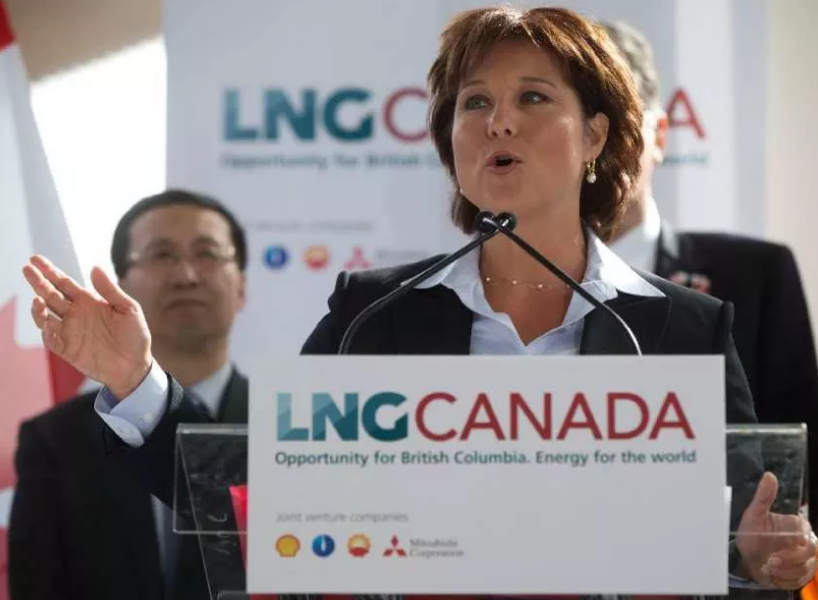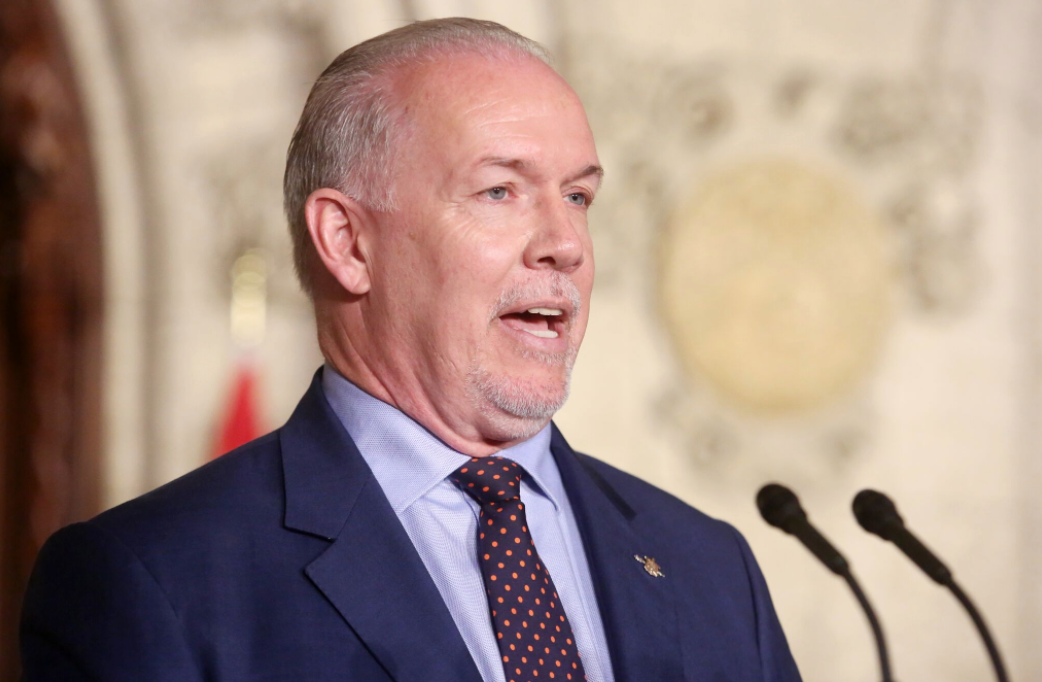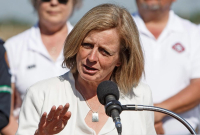Support strong Canadian climate journalism for 2025
British Columbia’s NDP government is being urged to “stand firm” in the face of oilpatch industry lobbying efforts, as newly-released correspondence sheds light on past attempts to influence provincial climate policy — and reduce industry costs in the process.
In April last year, the correspondence shows, Canada’s largest oil and gas lobby group — the Canadian Association of Petroleum Producers (CAPP) — asked the BC Liberal government of the day to cut its members a multimillion dollar financial break. This financial support was being sought as industry was facing the prospect of draft rules to force them to start reducing their climate-warming methane pollution.
CAPP also encouraged the provincial government not to increase its $30 per tonne carbon tax until “other competing jurisdictions” develop similar policies, and to create “economic support solutions” that would reduce the financial burden for companies that electrify their liquified natural gas (LNG) projects.
The industry lobby group's requests were sent in a letter from its vice-president for Western Canada operations, Brad Herald, to then-deputy natural gas minister Dave Nikolejsin. It outlined CAPP’s response to policy recommendations from the B.C. government’s Climate Leadership Team (CLT) and included a request for what it described as "economic support solutions."
Greenpeace Canada, which obtained the document through provincial freedom of information legislation, urged the government to resist the industry's lobbying efforts.
The industry association, whose members produce 85 per cent of Canada’s natural gas and crude oil, denied that it asked the B.C. government to subsidize climate action and said it is “broadly supportive” of the province’s climate policy framework.

Asking the province to pay for climate action
Greenpeace Canada has a different interpretation of the letter. The environmental group said CAPP was essentially asking B.C. taxpayers to pay for emissions reductions that would eventually be required by the federal government anyway.
In spring that year, Ottawa promised to cut methane emissions by 40 to 45 per cent below 2012 levels by 2025. Methane is one of the world’s major greenhouse gases, and warms the planet over 80 times more than carbon dioxide over 20 years once it’s released into the air.
Canada’s oil and gas industry is responsible for 42 per cent of the country’s methane emissions, and since 2016, CAPP has lobbied the federal government — successfully — to delay its regulations to cut back on methane.
But in April 2016, knowing regulations would be coming, CAPP asked the B.C. government for a “Clean Infrastructure Royalty Credit Program” to be implemented as soon as possible “to enable near-term project uptake and associated emissions reductions.” A government commitment of $20 million, CAPP explained, could lead to as much as $40 million worth of leveraged methane emissions reduction projects.
“The fact that they were essentially trying to double count — basically get the province to pay them for reductions that the federal government was going to force them to make — is shocking to me,” said Keith Stewart, senior energy strategist at Greenpeace Canada.
“It’s one thing to say ‘Okay, give us an incentive and we’ll do this thing you want us to do.’ It’s another thing to say, ‘Hey, the feds are making us do this — why don’t you pay for it?’”
Greenpeace's views line up with the findings of a report released by the International Monetary Fund, which describe this type of government support as a massive subsidy. In 2015, the Washington-based intergovernmental organization, which works to stabilize the global economy, described the absence of rules requiring companies to pay for the full cost of their pollution as a contributing factor to more than $5 trillion in global subsidies granted to fossil fuel companies annually.
CAPP also encouraged the province to “explore carbon compliance certification mechanisms” that would reward oil companies that reduce emissions with an equivalent tonne reduction in the amount they have to pay through the carbon tax. It further hinted that oil and gas producers should be able to generate carbon offsets for reducing methane emissions before the federal methane regulations take effect.
As for LNG projects — the letter called on the B.C. government to develop “economic support solutions” that “de-risk” the choice to electrify, which, at current rates, is a more climate-friendly but costly alternative to using natural gas to power the projects.
In other words, said, Stewart: “a subsidy.”
“Sometimes (CAPP will) fuss, but if you use the OECD definition of what is a subsidy, then what they’re asking for is a subsidy,” he insisted. “The New B.C. government is going to face enormous pressure from oil lobbyists and their allies, and we’re partially here to say, stand firm and we’ll stand with you.”

CAPP denies “subsidies”
In an interview with National Observer, Herald, whose name is on the CAPP letter, denied that requests described in the letter — such as "economic support solutions" or the requested tax breaks — were subsidies. What the association’s letter proposes, he explained, is a “tax shift” that maintains the provincial carbon price, but offers the industry relief in other areas so as to protect its ability to make money.
“Nowhere in the letter does it ask for subsidies,” he said. “What I would say is that, while we’re broadly supportive of the climate policy framework in British Columbia, we continue to be concerned about competitiveness…We’re trying to balance effective outcomes with efficient ways to get there.
“It can be a zero-sum game. It’s not coming out of somebody else’s pocket — you’re paying one area…you’re getting the management discipline that comes with that, but you maintain competitiveness by using tax shifting.”
CAPP’s letter indicates its support for a climate policy framework in the province that “creates a vibrant and competitive oil and gas sector” while efficiently managing greenhouse gas emissions. But a carbon tax, it argued, isn’t the most efficient way to get there, and it asked that methane emissions continue to be exempt:
“Additionally, CAPP believes properly designed and prescribed programs will achieve greater reductions than those that would be achieved through a carbon tax approach, which increases operating costs and could discourage needed investment from BC,” it said.
Methane reductions a “low-cost” solution
Amin Asadollahi, North American lead on climate change mitigation for the International Institute for Sustainable Development, fundamentally disagreed with CAPP’s climate logic. Fluctuating market prices, he explained, ultimately have a much bigger impact on the industry’s returns than B.C.’s carbon tax — which companies can actually write off on their taxes as an expense.
“Based on provincial rules, carbon taxes, when written off as an expense could lower taxes and/or royalties paid – this revenue forgone, could be treated as a type of fossil fuel subsidy,” he said in an email statement.
“Putting a price on carbon pollution incentivizes improved energy use, a major cost item at many oil and gas facilities, and as a result, it can help increase the sector’s competitiveness while rewarding facilities that emit less.”
The federal government’s methane regulations, he added, are likely to cost the oil and gas industry between $3 and $15 per ton — a fraction of what the federal carbon price will cost companies when it reaches $50 per ton in 2022.
“Methane requirements are low-cost solutions with significant environmental and economic benefits,” he explained. “Methane is one of the lowest emission reduction opportunities in the oil and gas sector. If anything, the sector should be advocating for more stringent rules around methane where cost effective solutions are abundant.”
As for CAPP’s claim that it did not ask for climate action “subsidies,” Asadollahi responded:
“If the value of royalties avoided is higher than the investment by the company for what the company is doing or should be doing, then that could be treated as a fossil fuel subsidy.”

Will lobbying work under Horgan?
Pursuant to CAPP’s lobbying efforts, the federal government has delayed the start date of its methane crackdown until after the next federal election in 2019. It appears that in B.C., as well, the association’s efforts bore fruit.
After CAPP sent the letter to B.C.’s then-natural gas minister, four months later, the BC Liberal government granted the $20-million royalty decrease outlined in the letter to help companies finance methane reductions. It did not increase its provincial carbon tax, as CAPP recommended, or expand it to include leaked methane emissions from oil and gas production.
The B.C. government declined to comment on whether such decisions were the direct result of CAPP’s lobbying. Speaking on background, however, an official within the provincial ministry of energy, mines and petroleum said the new minister responsible for resource development has yet to meet with the oilsands lobby group.
The future of the former government's royalty credit program for industry is up in the air, said the official, but the provincial carbon tax will increase by $5 per ton per year beginning in April 2018, in order to meet new federal requirements. The carbon tax, the official confirmed, will also be expanded to include leaked emissions.
According to Elections BC, since 2012, CAPP has donated $14,925 to the BC NDP party, compared with $85,325 to the BC Liberals.
British Columbia Premier John Horgan could not be reached for comment on this story, but in an emailed statement, the BC Green Party expressed concern “about the level of access that special interests appear to receive to government, whether through donations or other means.” The governing agreement struck between the two parties before ousting then-BC Liberal leader Christy Clark from power includes a multi-year prohibition on lobbying for former senior public office holders, a review of the Lobbyists Registration Act, and increased penalties for violations of that act.
“I’m excited by the opportunity we have today to implement significant reforms on lobbying and campaign finance in B.C.,” party leader Andrew Weaver told National Observer. “Government has the opportunity to ensure that the interests influencing government decisions are those that matter most: the interests of British Columbians.”
According to the CAPP document, the upstream oil and gas industry accounts for roughly 13 per cent of B.C.’s total emissions. In 2013, upstream oil and gas industry methane emissions accounted for 20 per cent of the province’s total methane emissions.
Ottawa’s proposed methane regulations, currently under public review, would help reduce nationwide emissions by 282 megatons of carbon dioxide equivalent — the same as taking nearly 60 million cars off the road for a year.





Comments
The ever overflowing pockets of the oil and gas industry simply need to be providing lower dividends to shareholders to realize, "economic support solutions."
Likewise, land stolen from extremely poorly compensated landowners by the NEB Act, need to also go to the same trough, claiming, ‘Hey, the feds are making us do this — why don’t you pay for it?’”
To make taxpayers pay the rich to get richer at our expense, is NOT my Canada.
Nor should it be yours.
WTF.
CAPP: mastering the art of obfuscation.
Dear CAPP Petroleum Boys,
I'm hoping my grandkids will breathe clean air, eat clean food and drink clear water. This is why I work with David Suzuki's Blue Dot movement- our goal to guarantee these rights, already guaranteed by many countries, to us Canadians. When I look at the science fiction moonscape that is the Alberta Tar Sands, with the evanescent Boom And Bust Fort McMurray now down to wildfires, I see no positive benefits to my family, Canada and planet Earth in honouring your plea for$$$.
Dear CAPP Petroleum Boys,
I'm hoping my grandkids will breathe clean air, eat clean food and drink clear water. This is why I work with David Suzuki's Blue Dot movement- our goal to guarantee these rights, already guaranteed by many countries, to us Canadians. When I look at the science fiction moonscape that is the Alberta Tar Sands, with the evanescent Boom And Bust Fort McMurray now down to wildfires, I see no positive benefits to my family, Canada and planet Earth in honouring your plea for$$$.
So CAPP wants the taxpayer, who will end up suffering and paying for Industry pollution, to pay again so that the basically uneconomic polluting activities can continue. The arrogance is truly beyond belief.
CAPP should listen to what they're saying. The only reason that Canada and BC adopt a carbon tax approach to the carbon emissions problem is because CAPP and the industry is 100% unwilling to do it themselves. Until recently, the entire industry, including CAPP, were climate change deniers or Trump supporters. Now they simply want a voice in the issue to support shareholder dividends, and industry profits. Do not forget the smoking industry and its efforts to disclaim links to cancer. They are deliberately harming human beings to improve their profits.